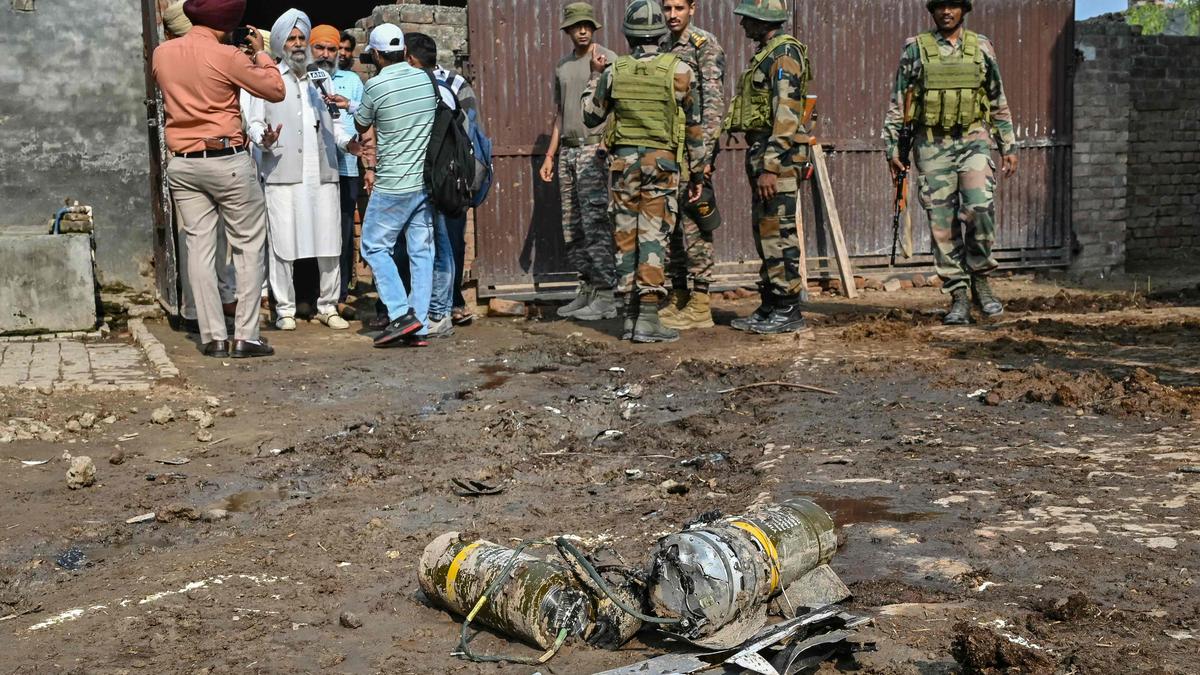Pakistan and India moved closer to all-out war as each said they struck the other’s military sites in the early hours of Saturday.
Pakistan said it began a counter-attack after Indian jets struck three of its airbases with missiles, including Noor Airbase in Rawalpindi, which holds the army’s headquarters and is located close to the capital Islamabad. The army said it retaliated by hitting Indian airbases and other military sites in Punjab state and the Indian-controlled part of Kashmir region.
India’s army said in a post on X it repelled multiple drone attacks from Pakistan, including at Khasa Cantonment in the northern city of Amritsar, the location of an Indian military station. At a briefing on Saturday, officials in New Delhi denied Pakistan’s claims that Indian airbases were destroyed. India’s army carried out “precision attacks” on military targets in Pakistan, including Sialkot airbase, the official said.
Vikram Misri, India’s foreign secretary, blamed Pakistan for escalating the conflict by targeting civilian sites in cities like Srinagar, the capital of India’s Jammu and Kashmir region, and Rajouri.
Pakistan strikes targeted a medical center, school and airbases in Srinagar, Awantipora and Udhampur, he said.
The tit-for-tat military action, now in its fourth day, has brought tensions between the two nations to their most dangerous levels in decades. Both sides have been shooting missiles and drones over densely populated cities, prompting the US and other countries to seek a diplomatic solution and prevent a full-scale war between nations holding about a fifth of the global population.
A resident shows a fragment of a mortar shell after the cross-border shelling near the Line of Control (LoC) between Pakistan and India in Chakothi village of Pakistan-administered Kashmir on May 10, 2025. © Photo credit: AFP
China’s Ministry of Foreign Affairs said it was “deeply concerned about the escalation” in hostilities. It called for both sides to “refrain from any action that could further escalate tensions,” which it said was needed for peace and stability in the region.
Pakistan’s local media reported Saturday that Prime Minister Shehbaz Sharif had called a meeting of the National Command Authority, which takes decisions on nuclear weapons. Deputy Prime Minister Ishaq Dar didn’t confirm the meeting when asked about it on Geo TV, only saying that “in a state of war, we have all the options.”
“We hope India will now choose dialogue over escalation,” Ahsan Iqbal, Pakistan’s planning minister, said in a statement posted on the ministry’s X account. He added that Pakistan doesn’t wish to see the no-first-use nuclear doctrine unravel.
Pakistan closed its airspace for all flights until noon Sunday. India also announced the closure of 32 airports in the northern and western parts of the country, and suspended 25 air route segments, until May 15.
Omar Abdullah, the chief minister of the region, said on X that an administration official was killed in Rajouri town in Jammu and Kashmir in the strikes.
Tensions between the countries erupted on April 22, when suspected militant gunmen in India’s Jammu and Kashmir region killed 26 civilians, mainly Hindu tourists. India called the attack an act of terrorism and accused Pakistan of involvement, allegations Islamabad has denied.
This week, the situation escalated dramatically when India carried out a operation against what it described as terrorist camps inside Pakistan. The strikes on nine targets, which Pakistan’s army said killed 31 civilians, were the deepest breach of Pakistani territory by India since the 1971 war.
A resident is pictured inside his damaged house following the cross-border shelling near the Line of Control (LoC) between Pakistan and India in Chakothi village of Pakistan-administered Kashmir on May 10, 2025. © Photo credit: AFP
US Secretary of State Marco Rubio held a phone call with Pakistan army chief Asim Munir and Indian External Affairs Minister Subrahmanyam Jaishankar in a bid to de-escalate tensions.
“He continued to urge both parties to find ways to de-escalate and offered U.S. assistance in starting constructive talks in order to avoid future conflict,” spokesperson Tammy Bruce said in a statement on Saturday.
White House Press Secretary Karoline Leavitt on Friday said President Donald Trump has “good relationships with the leaders of both countries.”
Foreign ministers from the Group of Seven called for restraint on both sides, saying in a statement that “further military escalation poses a serious threat to regional stability.”
“We call for immediate de-escalation and encourage both countries to engage in direct dialogue towards a peaceful outcome,” it said. “We continue to monitor events closely and express our support for a swift and lasting diplomatic resolution.”
The conflict has roiled financial markets in both nations. India’s NSE Nifty 50 index dropped more than 1% on Friday, the most in a month. After plunging on Thursday, Pakistan stocks rose on Friday before the International Monetary Fund approved a $1 billion loan disbursement.
Pakistan and India have clashed several times over the disputed region of Kashmir since independence from Britain in 1947. The last time the two nations came close to an all-out war was in 2019, after a suicide bomber killed 40 members of India’s security forces. India blamed Pakistan and responded about two weeks later with its first airstrikes on Pakistani soil since 1971. Pakistan retaliated by shooting down an Indian jet and arresting the pilot, who was later released. Tensions died down soon afterward.
